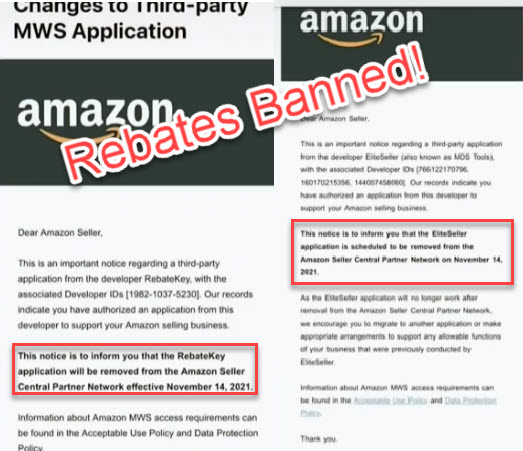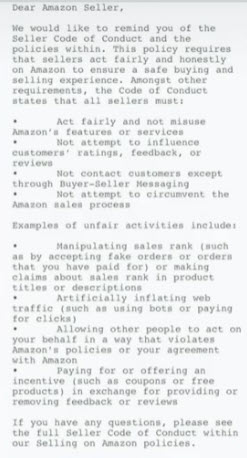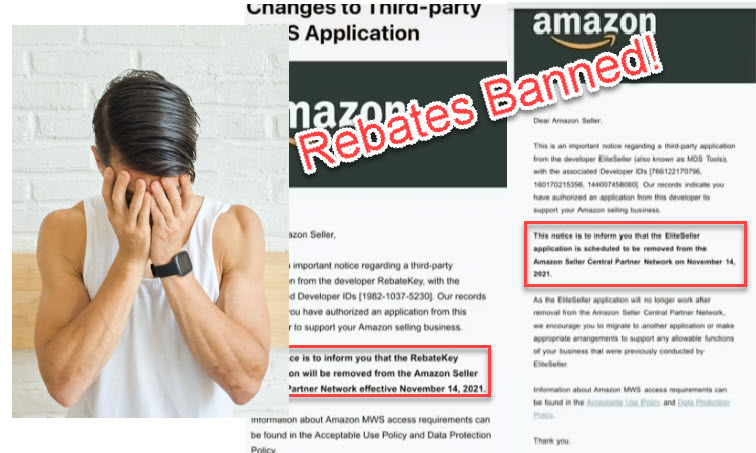Amazon never leaves us wanting for more drama. Keeping up with the latest precedent is often the difference between massive sales & permanent account suspension.
Using rebates for ranking on Amazon has always been a hotly debated topic, but recently Amazon has made it clear they intend to crack down on this tactic in a big way.
I recommend stopping using rebates for ranking on Amazon and focus on longer-term marketing strategies to increase sales.
Why Stop Now?
There are 3 big moves that just happened that would indicate the end is here for Amazon rebates.
- RebateKey and EliteSeller (2 of the biggest rebate companies) are being removed from the Amazon Seller Central Partner Network
- Many sellers received emails from Amazon “reminding” them not to manipulate sales rank
- FTC releases article “FTC Puts Hundreds of Businesses on Notice about Fake Reviews and Other Misleading Endorsements”
We’ll dive more into each topic below.
What are Amazon rebates?
If you’re in-the-know you can skip this brief overview of Amazon rebates.
Amazon rebate offers are when brands offer cashback after purchasing their product to customers looking for free stuff/ great deals, in hopes of getting more sales.
There are many multi-million dollar rebate sites like RebateKey, Rebaid, Rebate Jet, & Rebate Check that match brands to shoppers hungry for cheap or free Amazon deals.
For example, if you’re selling an iPhone 6 case on Amazon, you can use a service like RebateKey to get it in front of shoppers who will happily purchase it with the agreement you will give them a full or partial cash back after.
To Amazon it appears as a full-priced sale because brands send rebate payments to the customer through PayPal, visa gift card, or other means of direct deposit not trackable to your Amazon account.
This gets around the fact that Amazon doesn’t give as much ranking weight to sales from 90%-off coupon deals, discounts, or promotions giving away products free.
While this has been a successful and popular tactic in recent years, it appears Amazon is sending a strong message this is no longer ok.
Some brand owners argue that as long as you don’t ask for a review, you’re not breaking Amazon’s terms of service. While this may be true, it seems Amazon may see rebates as manipulating sales rank and could lead to more fake reviews on their platform. Something they’re under intense scrutiny for by the FTC.
RebateKey and EliteSeller Removed From Amazon Partner Network

This is the announcement shaking the Amazon Seller community. As two of the largest rebate services for Amazon Sellers, Amazon removing them from the Service Provider Network and revoking their Amazon API access is a big deal.
It sends a strong message that has the seller community buzzing with cries of “rebates are dead” & “I saw this coming years ago.”
While Amazon has not made an official statement banning using rebates to promote your products, they rarely have in past similar situations. Amazon traditionally makes bold changes to their algorithm, suspends large amounts of sellers, and third-party sellers are left to decipher the intent on their own.
Unlike Google SEO who have an open dialogue with search engine optimizers, Amazon prefers to keep their cards close to their chest.
While we can’t know for sure this slap to RebateKey and EliteSeller is specifically because of rebates, it’s definitely a high likelihood… especially when combined with the next points.
Amazon Sent Out Emails to Sellers About “Manipulating Sales Rank”

Now this is nothing new, Amazon has been sending out these types of emails to sellers suspected of grey-hat ranking tactics for years, but the timing seems to be correlated to the RebateKey removal.
A large number of sellers in the community have received the following email from Amazon.
Dear Amazon Seller,
We would like to remind you of the Seller Code of Conduct and the policies within. This policy requires that sellers act fairly and honestly on Amazon to ensure a safe buying and selling experience. Amongst other requirements, the Code of Conduct states that all sellers must:
• Act fairly and not misuse Amazon’s features or services
• Not attempt to influence customers’ ratings, feedback, or reviews
• Not contact customers except through Buyer-Seller Messaging
• Not attempt to circumvent the Amazon sales process
Examples of unfair activities include:
• Manipulating sales rank (such as by accepting fake orders or orders that you have paid for) or making claims about sales rank in product titles or descriptions
• Artificially inflating web traffic (such as using bots or paying for clicks)
• Allowing other people to act on your behalf in a way that violates Amazon’s policies or your agreement with Amazon
• Paying for or offering an incentive (such as coupons or free products) in exchange for providing or removing feedback or reviews
If you have any questions, please see the full Seller Code of Conduct within our Selling on Amazon policies.
As per usual, the language is very vague, but this email went out at the exact same time as the emails regarding RebateKey… seems to me to be connected but who knows.
FTC Puts Hundreds of Businesses on Notice about Fake Reviews and Other Misleading Endorsements
This one is huge. Amazon has been under pressure from the FTC for many years regarding fake reviews, and the precedent for big tech companies to be held responsible for what happens on their platform has been set.
Facebook has been under intense scrutiny for the Cambridge Analytica scandal, and ultimately were held responsible for what their users were doing on their platform.
You can bet top dollar Amazon will work hard to avoid a similar situation. If they don’t prove to the FTC they are doing enough to stop fake reviews and misleading endorsements on their platform, they know a giant legal nightmare is right around the corner.
The FTC just sent more than 700 “Notice of Penally Offenses” notices which can incur penalties up to $43,792 per offense.
So if they go after Amazon Sellers, imagine paying $40k for each of the 250 fake reviews you got. That would be $1,000,000. If they went after Amazon directly, you can bet that number would be in the multi-billions.
The FTC released a list publically showing the 700+ companies they sent a notice to. It includes many big-name brands, including Amazon themselves.
Notable Recipients of FTC’s Notice of Penalty Offenses
- Amazon
- Walmart
- Disney
- Air BnB
- Adobe
- Volkswagon
They include the caveat “The fact that a company is on this list is NOT an indication that it has done anything wrong.” So this least appears to be a warning rather than a full-blown conviction.
But in any case, it’s a warning shot to businesses using fake reviews, and could explain Amazon’s strong stance taken on RebateKey and EliteSeller.
See the FTC’s full announcement here.
Customers for Free Stuff May Leave Biased Reviews
Amazon isn’t subtle about their low-tolerance for biased reviews. They’ve faced serious warnings from the FTC on the matter and have proven to have 0 tolerance for brands manipulating reviews.
I speculate that Amazon may see too much correlation between shoppers getting free stuff and leaving biased reviews. Especially now that the FTC has clearly called them out on this matter, they are under more pressure to fix the problem of fake reviews on the platform.
We have to look at this from the lens not only how Amazon might see this, but also how the FTC does. Would the FTC have a problem with shoppers getting rebate payments before leaving a review? That certainly seems like a bias to me.
Even if we tell rebated customers to not leave reviews, a percentage of them always will and those reviews would be biased.
Conclusion: Are Amazon Rebates for Ranking Dead?
While it hasn’t been explicitly stated by Amazon, there’s strong evidence to say they’re fed up with rebates.
Sellers in the FBA space have long argued that rebates are good for Amazon, but that argument is getting harder to make amongst pressure from the FTC and the removals of RebateKey and EliteSeller.
My personal recommendation is to stop doing rebates immediately and focus those dollars on sustainable marketing.
- Double down on Amazon Ads & Amazon coupon deals
- Grow external marketing channels such as Google SEO
- Build an actual brand
But I know most sellers will ignore this advice, because you’ve all been ignoring it for years. That’s how we end up in this mess every time Amazon cracks down on a popular ranking tactic.
The problem with sustainable marketing is that it’s slow, time-consuming, and hard. It’s like doing math problems on paper when a calculator is sitting right next to you. Except in this case the calculator has a Tesla battery and could burst into flames at any moment, destroying years of work.
Let this be the stimulus you need to close your Rebaid account and put in the work to grow into a sustainable brand that people will buy from long past Amazon’s next “big slap.”
Amazon TOS Safe Ways to Grow Sales
At Kenji ROI, we’ve been helping brands thrive on Amazon since 2016 with 100% white-hat, sustainable marketing tactics that will make any strategy perform better.


